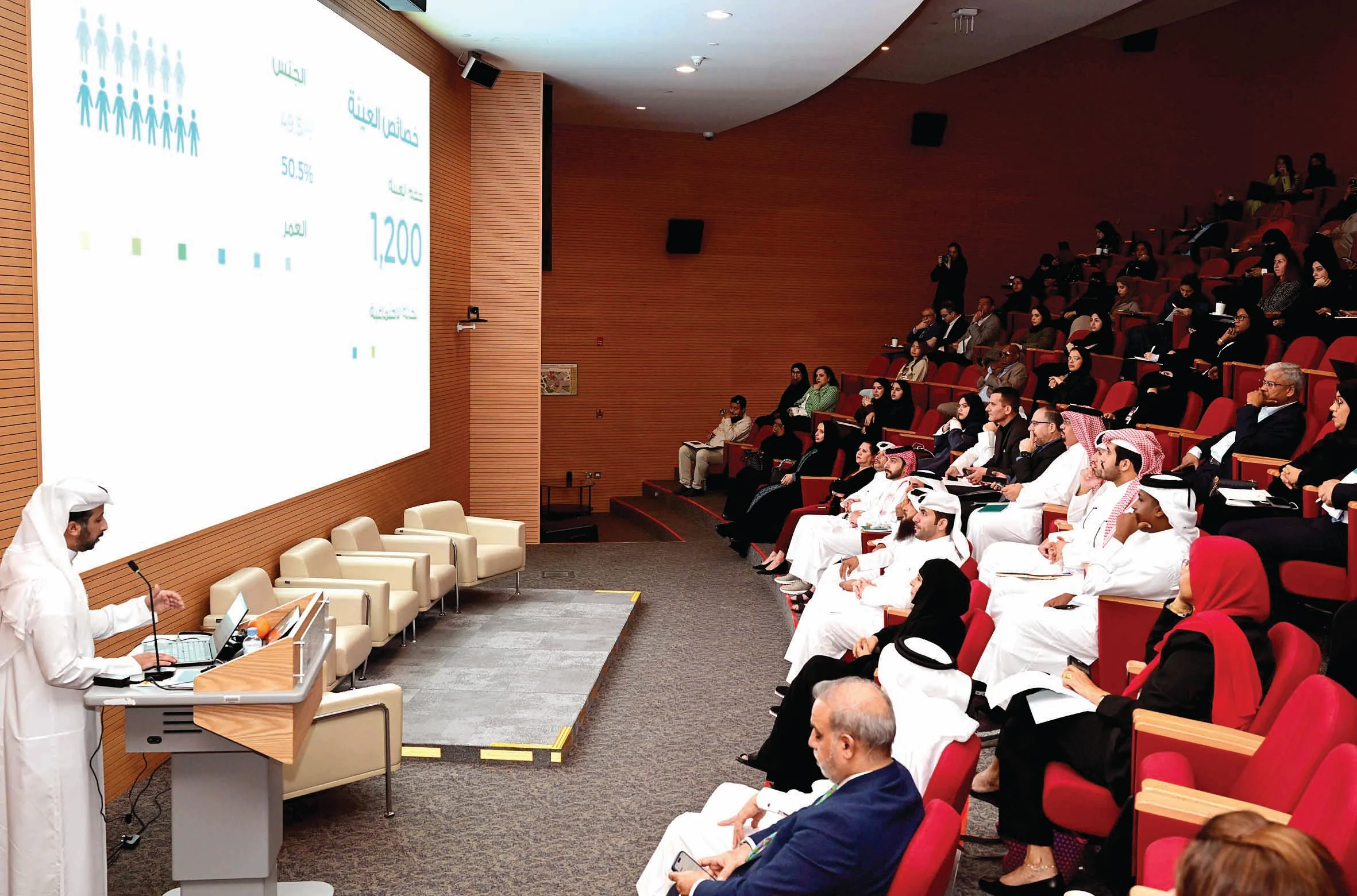QU Organizes Workshop Titled ‘The National Identity in Qatar’
ورشة حول الهوية الوطنية في جامعة قطر
QNA
Doha: The Social and Economic Survey Research Institute (SESRI) at Qatar University (QU) organized a workshop titled ‘The National Identity in Qatar.’ The workshop aims to define the concept of national identity in the State of Qatar through scientifically based studies, contribute to the scientific field related to national identity in Qatar, and connect researchers with stakeholders, beneficiaries, and relevant parties in both the private and public sectors to discuss their experiences on this subject. The workshop also seeks to share and discuss the study’s results.
The workshop included a presentation of the study’s results by researcher Fahad Al Buainain and a panel discussion with the participation of HE Khalid bin Nasser bin Ghanim Al-Maadheed, a member of Qatars Shura Council and the Director of Wijdan Cultural Center; Dr. Jassim Sultan, a Qatari thinker and strategic advisor; Prof. Hassan Al Sayed, a constitutional law professor at QU; Maryam Yassin Al-Hammadi, Director of the Department of Culture and Arts at the Ministry of Culture; and Dr. Buthaina Al-Janahi, the founder and CEO of Qalam Hebr Company.
Secretary-General of the Qatar National Archive Dr. Ahmed Abdullah Al Buainain praised the workshop’s significance, stating, “This workshop highlights the importance of understanding and enhancing our national identity, a cornerstone for constructing and advancing societies and nations. It distinguishes each country through its culture, social norms, policies, and civilization. National identity serves as the cultural code for societies, facing internal and external challenges and necessitating intensive efforts to preserve and enhance it.” Dr. Al Buainain added, “The role of the Qatar National Archive in this context cannot be ignored. The institution plays a vital role in preserving the national memory and enhancing Qatari identity by preserving documents and historical records integral to our cultural and civilizational heritage. The Qatar National Archive also facilitates access to these resources for researchers, academics, and the public, deepening our understanding of the past and guiding our future path.” Highlighting the role of state institutions, Dr. Al Buainain said, “In the face of a changing world and the numerous challenges to our national identity, educational and research institutions, such as QU and SESRI, must contribute to monitoring these challenges and proposing public policies that help preserve and enhance our identity. These workshops represent a unique opportunity to exchange ideas and experiences and shape a future that maintains our national identity in the face of global challenges.” In her speech, Director of SESRI at QU Prof. Kaltham Al Ghanim stated, “This study measures levels of adherence to national identity and provides reliable data on the determinants of national identity. Data collected from a representative model of citizens, totaling 1202, resulted in scientific findings that will contribute to enhancing scientific knowledge about national identity and its challenges.” Prof. Al Ghanim added, “The goal of our activity today is to convey these results to relevant parties and researchers, discuss the study’s results, clarify the concept, characteristics, and threats to national identity in Qatar, and promote collaboration, idea exchange, and contribution to knowledge in the field of national identity.” The concluding remarks underscored several key points imperative for the preservation and enhancement of Qatari national identity. Firstly, there is an emphasis on the ongoing application of studies that delve into the evolution of national identity over time, fostering a comprehensive understanding of its dynamic nature. Additionally, a crucial aspect involves acknowledging the potential pitfalls of veering away from the Arabic language, as it is intricately linked to societal identity. This necessitates the implementation of studies aimed at safeguarding the Arabic language.
Moreover, the significance of parental guidance in instilling socially acceptable values in Qatari society is highlighted, recognizing the pivotal role parents play in shaping the perspectives of the younger generation. Public institutions are urged to play a vital role in educating Qatari families about the potential repercussions of relying heavily on domestic workers, emphasizing the potential negative impact on Qatari identity, particularly in the context of family life and child upbringing.
The workshop stressed the paramount importance of speaking Arabic with children and promoting the use of the Arabic language in educational and work places. Furthermore, it underscored the need to instill national values in the youth and foster a commitment to the elements that constitute national identity. Building on the study’s findings, which indicate high levels of pride in national identity and belonging, it is deemed necessary to continue existing initiatives such as National Day celebrations and adherence to official dress codes. These activities serve as vital components in reinforcing and perpetuating the rich tapestry of Qatari national identity.
قنا
الدوحة: نظم معهد البحوث الاجتماعية والاقتصادية المسحية بجامعة قطر ورشة بعنوان (الهوية الوطنية في دولة قطر) بمشاركة عدد من الخبراء والأكاديميين المعنيين في التراث والهوية.
وتهدف الورشة إلى تحديد مفهوم الهوية الوطنية في دولة قطر من خلال دراسات ذات أسس علمية، والمساهمة في المجال العلمي المتعلق بالهوية الوطنية في دولة قطر، وربط الباحثين بأصحاب المصلحة والمستفيدين والأطراف المعنية في القطاعين الخاص والعام لمناقشة تجاربهم فيما يتعلق بهذا الموضوع، ومشاركة ومناقشة نتائج الدراسة التي أعدها معهد البحوث الاجتماعية والاقتصادية المسحية بجامعة قطر.
وتخلل الورشة عرض لنتائج الدراسة قدمه الباحث فهد البوعينين وحلقة نقاشية شارك فيها سعادة السيد خالد بن غانم المعاضيد، مدير مركز الوجدان الحضاري وعضو مجلس الشورى، والدكتور جاسم سلطان، مفكر ومستشار استراتيجي، والدكتور حسن السيد، أستاذ القانون بجامعة قطر، والسيدة مريم ياسين الحمادي، كاتبة ومدير إدارة الثقافة والفنون بوزارة الثقافة، والدكتورة بثينة الجناحي، المؤسس والرئيس التنفيذي لشركة قلم حبر.
وقال الدكتور أحمد البوعينين، الأمين العام لدار الوثائق القطرية، في كلمة “تأتي هذه الورشة لتبرز أهمية فهم وتعزيز الهوية الوطنية في دولتنا، حيث تعد الهوية حجر الزاوية لبناء وتطور المجتمعات والدول، وهو ما يميز كل دولة عن غيرها بثقافتها، اجتماعياتها، سياساتها، وحضارتها، مؤكدا أن الهوية الوطنية بمثابة الشفرة الحضارية للمجتمعات، والتي تواجه تحديات متعددة من الداخل والخارج، مما يتطلب جهودا مكثفة للحفاظ عليها وتعزيزها”.
وأوضح أن دار الوثائق القطرية تلعب دورا حيويا في حفظ الذاكرة الوطنية وتعزيز الهوية القطرية من خلال الحفاظ على الوثائق والسجلات التاريخية التي تشكل جزءا لا يتجزأ من تراثنا الثقافي والحضاري. كما تعمل على إتاحة هذه الموارد للباحثين والأكاديميين والجمهور، مما يساعد في تعميق فهمنا للماضي وتوجيه مسار مستقبلنا.
وأكد البوعينين على دور مؤسسات الدولة قائلا:” وفي ظل العالم المتغير والتحديات العديدة التي تواجه هويتنا الوطنية، من الضروري أن تسهم المؤسسات التعليمية والبحثية مثل جامعة قطر ومعهد البحوث الاجتماعية والاقتصادية المسحية في رصد هذه التحديات واقتراح سياسات عامة تساعد في الحفاظ على هويتنا وتعزيزها، منوها إلى أن هذه الورش تمثل فرصة فريدة لتبادل الأفكار والخبرات وتشكيل مستقبل يحافظ على هويتنا الوطنية في مواجهة التحديات العالمية”.
وفي كلمتها قالت الدكتورة كلثم الغانم مدير معهد البحوث الاجتماعية والاقتصادية المسحية بجامعة قطر:” جاءت هذه الدراسة لتقيس مستويات التمسك بالهوية الوطنية، وتوفير بيانات موثوقة حول محددات الهوية الوطنية. وقد تم جمع بيانات من عينة ممثلة من المواطنين بلغت 1202، والخروج بنتائج علمية، هذه النتائج سوف تساهم في تعزيز المعرفة العلمية بخصوص موضوع الهوية الوطنية وإشكالياتها”.
وأضافت :”هدف فعاليتنا اليوم هو إيصال هذه النتائج للجهات ذات الصلة وللباحثين، ومناقشة نتائج الدراسة وتوضيح مفهوم وخصائص ومهددات الهوية الوطنية في دولة قطر وطرق تعزيز هذا المفهوم، وزيادة التعاون وتبادل الأفكار والمساهمة في مجال المعرفة التي تتعلق بالهوية الوطنية”.
ودعا المشاركون في ختام الورشة إلى أهمية استمرار تطبيق دراسات الهوية الوطنية عبر الزمن ومعرفه التغيير، وإدراك خطر البعد عن اللغة العربية على هوية المجتمع، وتنفيذ الدراسات التي تساهم في الحفاظ على اللغة العربية، والتركيز على دور الأهل في تعليم الأولاد ما هو مقبول وما هو غير مقبول في المجتمع القطري، وعلى أن تقوم المؤسسات العامة بتوعية الأسر القطرية من خلال برامج تنبه إلى عواقب الاعتماد على عاملات المنازل في الحياة الأسرية وتربية الأطفال، الأمر الذي قد تكون له آثاره السلبية على تعزيز الهوية القطرية.
كما أكدت على أهمية التحدث باللغة العربية مع الأطفال، والاعتماد على اللغة العربية في التعليم وفي أماكن العمل، بالإضافة إلى غرس القيم الوطنية عند الشباب والالتزام بعناصر الهوية الوطنية، وبناء على نتائج الدراسة التي تشير إلى نسب عالية من الاعتزاز بالهوية الوطنية والانتماء الوطني فإن الاستمرار بالأنشطة الحالية مثل الاحتفال باليوم الوطني والالتزام باللباس الرسمي وغيرها من الأنشطة المتعلقة بالهوية الوطنية، أمر ضروري.




